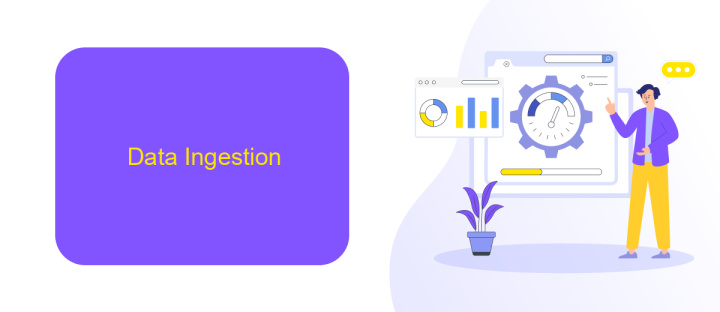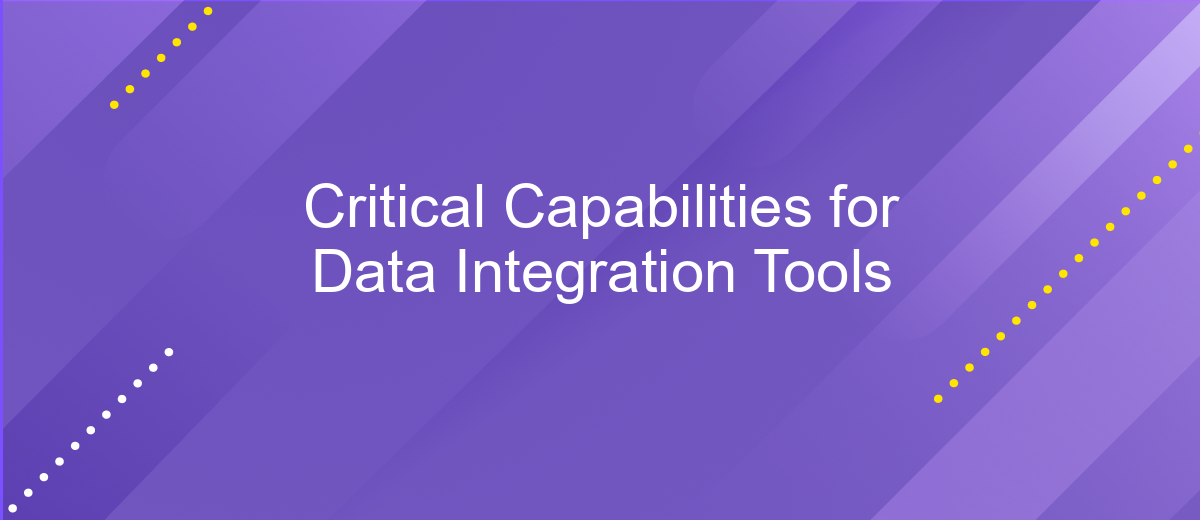Critical Capabilities for Data Integration Tools
In today's data-driven world, the ability to seamlessly integrate diverse data sources is crucial for organizational success. Critical Capabilities for Data Integration Tools explores the essential features and functionalities that modern data integration solutions must possess. From real-time processing to robust data governance, this article delves into the key attributes that empower businesses to unify and leverage their data effectively.
Data Connectivity
Data connectivity is a critical aspect of data integration tools, enabling seamless access to a wide variety of data sources. Effective data integration tools provide robust connectivity options that support diverse data environments, from traditional databases to modern cloud-based systems. This ensures that organizations can leverage their existing data assets while seamlessly incorporating new data sources as they emerge.
- Support for various database types, including SQL, NoSQL, and NewSQL
- Integration with cloud storage solutions like AWS S3, Google Cloud Storage, and Azure Blob Storage
- Compatibility with big data platforms such as Hadoop and Spark
- APIs and connectors for popular SaaS applications like Salesforce, Workday, and ServiceNow
- Real-time data streaming capabilities with tools like Kafka and Apache Pulsar
By offering comprehensive data connectivity options, data integration tools empower organizations to create a unified data ecosystem. This enhances data accessibility, improves decision-making processes, and enables the development of innovative data-driven solutions. Ultimately, robust data connectivity is essential for maximizing the value of an organization's data assets.
Data Ingestion

Data ingestion is a critical component of data integration, involving the process of collecting, importing, and processing data for storage in a database or data warehouse. This process can handle data from various sources, including databases, applications, and external systems, ensuring that the data is available for further analysis and reporting. Efficient data ingestion ensures that data is captured in real-time or in batches, depending on the requirements, and is crucial for maintaining data accuracy and consistency across the organization.
One of the tools that can significantly streamline the data ingestion process is ApiX-Drive. This service allows for seamless integration of various applications and systems, automating the data transfer without the need for extensive coding or manual intervention. ApiX-Drive supports a wide range of data sources and destinations, making it a versatile solution for businesses looking to optimize their data workflows. By leveraging such tools, organizations can ensure timely and reliable data ingestion, which is essential for informed decision-making and operational efficiency.
Data Integration

Data integration is a critical aspect of modern data management, enabling organizations to combine data from disparate sources into a unified view. This process is essential for gaining comprehensive insights, improving decision-making, and enhancing operational efficiency. Effective data integration ensures that data is accurate, consistent, and accessible to all relevant stakeholders.
Key capabilities of data integration tools include:
- Data Connectivity: Ability to connect to various data sources, including databases, cloud services, and APIs.
- Data Transformation: Tools to clean, format, and enrich data to meet specific business needs.
- Data Quality: Ensuring data accuracy, consistency, and reliability through validation and cleansing.
- Scalability: Handling large volumes of data and supporting growing data needs.
- Real-time Integration: Providing up-to-date data by integrating in real-time or near-real-time.
By leveraging these capabilities, organizations can streamline their data workflows and ensure that their data assets are effectively utilized. This leads to more informed business decisions, greater agility, and a competitive edge in the market. Investing in robust data integration tools is, therefore, a strategic imperative for any data-driven organization.
Data Transformation

Data transformation is a critical component of data integration that involves converting data from its original format into a format that is suitable for analysis, reporting, or further processing. This process ensures that data from diverse sources can be harmonized and made compatible for use in a unified system.
Effective data transformation addresses inconsistencies, duplicates, and errors within datasets, enhancing data quality and reliability. It involves a series of operations such as filtering, aggregation, enrichment, and normalization to prepare data for meaningful insights.
- Filtering: Removing irrelevant or redundant data.
- Aggregation: Summarizing data to provide higher-level insights.
- Enrichment: Adding valuable information to existing datasets.
- Normalization: Standardizing data formats for consistency.
By implementing robust data transformation processes, organizations can ensure that their data integration efforts yield accurate and actionable insights. This not only facilitates better decision-making but also enhances overall data governance and compliance.
Data Management and Governance
Effective data management and governance are critical for ensuring the accuracy, security, and accessibility of data within an organization. Establishing clear policies and procedures helps maintain data integrity and compliance with regulatory standards. Implementing robust data governance frameworks enables organizations to manage data assets efficiently, ensuring that data is consistent, trustworthy, and used responsibly across all departments.
In the realm of data integration, tools like ApiX-Drive play a pivotal role. ApiX-Drive simplifies the process of connecting various applications and services, allowing seamless data flow between systems. This not only enhances data accuracy but also ensures that data is readily available for analysis and decision-making. By automating data integration tasks, ApiX-Drive reduces the risk of human error and ensures that data governance policies are consistently applied, fostering a more reliable and efficient data management environment.
FAQ
What are the critical capabilities to look for in data integration tools?
How important is real-time data integration?
Can data integration tools handle both structured and unstructured data?
How do data integration tools ensure data quality?
What are the benefits of using automated data integration services?
Do you want to achieve your goals in business, career and life faster and better? Do it with ApiX-Drive – a tool that will remove a significant part of the routine from workflows and free up additional time to achieve your goals. Test the capabilities of Apix-Drive for free – see for yourself the effectiveness of the tool.

